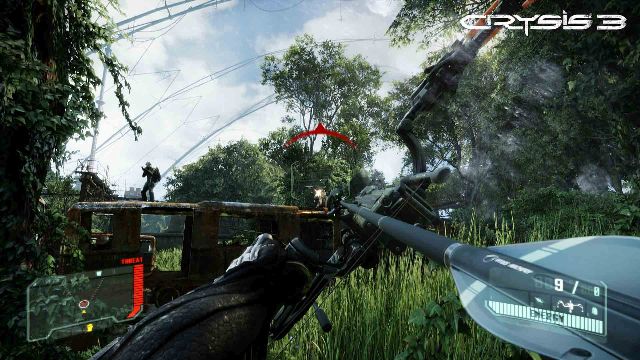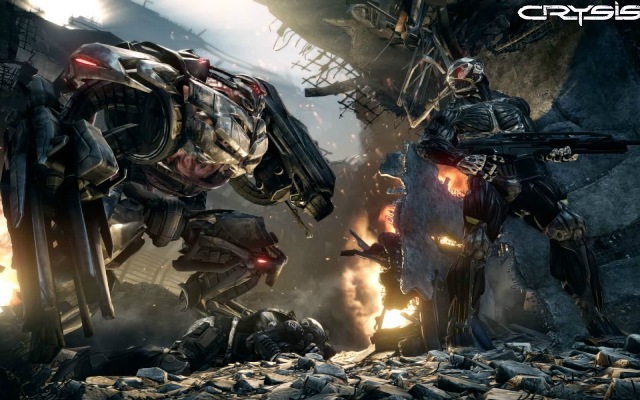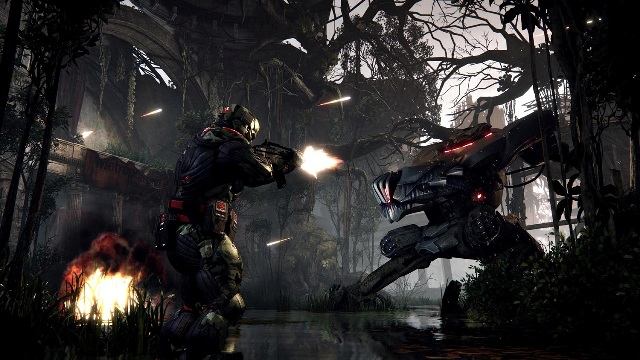Opinion: Crysis 3 – Sandbox or Playground?
 I’ve never been much of a hardcore gamer. That’s not to say I’m casual, either – I rack up an impressive (worrying?) number of gaming hours every week, and make it my business to play as many major releases as possible each year, to challenge my horizons as much as time and circumstance allow – but all of that goes hand-in-hand with being a games writer, a profession that demands you keep one eye on the cutting edge of the games market while dangling one foot eternally in the past (although we never say ‘old’, we say ‘retro’). My point is, I don’t play games to compete with others. I don’t have a pathological need to win at games to exert my power over strangers, to prove my social worth or because my real life sucks (it doesn’t, by the way), and I leave the competition for the rat-race.
I’ve never been much of a hardcore gamer. That’s not to say I’m casual, either – I rack up an impressive (worrying?) number of gaming hours every week, and make it my business to play as many major releases as possible each year, to challenge my horizons as much as time and circumstance allow – but all of that goes hand-in-hand with being a games writer, a profession that demands you keep one eye on the cutting edge of the games market while dangling one foot eternally in the past (although we never say ‘old’, we say ‘retro’). My point is, I don’t play games to compete with others. I don’t have a pathological need to win at games to exert my power over strangers, to prove my social worth or because my real life sucks (it doesn’t, by the way), and I leave the competition for the rat-race.
Because I really am Joe Average-Gamer – at least when it comes to my skill levels (which aren’t phat or mad so much as they’re sluggish and inconsistent) – I tend to play most games on the Normal or default setting. Usually, I’ll still struggle once or twice during a first play-through. There’ll be a mission with a difficult boss, or one room I just can’t clear, or a sudden application of cheap tactics that I don’t have the patience and skill to work around. Strategy titles in particular fox me. It’s not a question of pressure, but context. Short publishing deadlines don’t bother me, but flank my sniper and leave my infantry units trapped in a crossfire and I go to pieces.
The best games create a balance between what a given enemy or level can throw at you and what you can do to countermand their actions. Maintaining that equilibrium is where the player’s skill comes into the equation. If I play those games enough, even I can become proficient. On paper, even to an observer, Crytek’s Crysis 3 appears to be one such game.

The Predator Bow is one of the coolest and most satisfying weapons ever. It’s just a shame it’s so overpowered.
Without spoiling anything, it follows on from Crysis 2 after a jump of around 20 years. You’re still facing off against a mixture of highly-trained soldiers and the powerful, advanced alien shock troops of the Ceph, and you’re still Prophet, wrapped up inside the Nanosuit, a dense, lightweight exoskeleton that was badass before it became contaminated with the Ceph’s biotechnology. Most missions are laid out as a series of miniature sandboxes connected by corridors (they may look like sewers, overgrown urban areas or derelict tenements, but they’re very much corridors), in which you’re given a group of enemies to either perforate or circumvent as the Nanosuit and situation dictate. The problem is that Prophet’s cup – and, by extension, your own – runneth over with possibilities, no matter the enemy.
Here’s a game that pits you against seemingly insurmountable odds – a wall of advancing Ceph, for example, toting handheld Weapons of Mass Destruction, heightened reflexes and superior tactics – and wants you to plan each encounter minute-to-minute, to think on your feet, to combine the awesome powers and upgrades of the Nanosuit to overcome those odds, to surmount them, if you will, and come out feeling like badass because you deserve to.
Unfortunately – as I touched on in my review – the disparity between how Crysis 3 wants you to play and how it allows you to play is too large for greatness. A direct dichotomy to, say, Grin’s Bionic Commando, which gave you a shed-load of powers and tech and then allowed none of it to mean more than diddly-shit in a fight, Crysis 3 imbalances itself the other way.
“Here are some enemies,” it says. “They think they’re better than you. Show them who they’re stepping to.”
“I shall!” you shout, as you are wise in the ways of the FPS. “Just hand me a gun and point me towards injustice!”
“A gun?” scoffs Crysis 3. “Oh, you’re adorable. A gun, he says. Bless him. How about instead I give you two guns, a cloak of invisibility and a bullet shield that I will never penalise you for using? Maybe the ability to run faster and jump further than any man, or remote-hack any enemy tech in your line-of-sight by way of a piss-easy minigame? And would you like to be able to heal any damage you do manage to take by hiding for 4 seconds?”
“Wow. Ta. But what I was really hoping for was a one-shot-kill weapon that I can use from ridiculous range without breaking stealth and that has reusable ammunition. Also, I’d like it to explode stuff.”
“Ha, thanks for reminding me. Here’s the Predator Bow. It does everything you just said, and looks bitching. Enjoy! And try not to get too dirty.”

You can’t actually snap to cover like this in Crysis 3 – but then you don’t really need to either, as Prophet is a man-shaped battle-tank.
To call Crysis 3 “too easy” would be to belittle the effort Crytek have put into certain elements of the game, to suggest that they’ve made some massive oversight that has rendered it unplayable in some way when, in actual fact, all they’ve really done is made it slightly less fun than it should be. Well, quite a lot less fun than it should be. Crysis 3 is a good game – great, in some ways, not least of all those incredible visuals – but it could have been more.
Had Crytek put more effort into balancing the game, it could have been one of the most tactically-accomplished shooters ever made. Had they listened to the criticisms levelled at Crysis 2 and learned from them, they might have succeeded in creating a challenge truly worthy of the Nanosuit. I’m not suggesting that anything should have been taken away from it, but I believe that to wield such a power as that suit in a game like Crysis 3, penance should be paid. A game like Crysis 3 should be a balancing act every step of the way.
I have limited, finite energy to get across this area. Do I sacrifice stealth to take my enemy on as quickly and as efficiently as possible, or go in quietly to avoid getting pinned down and annihilated? And what is there scattered around the environment that I can turn to my advantage?
That’s what Crysis 3 should be – it should be about using those powers, the incredible gifts afforded by the Nanosuit, to make every action you take count. It should be about planning ahead, plotting a route under pressure and then executing it, and the great pay-off should be the feeling of massive accomplishment when you pull it out of the hat. It should not be the cake-walk that it so often is. There’s nothing inherently wrong with having powers beyond the means of normal soldiers, but they shouldn’t make you a God-like harbinger of death that only hits a wall of difficulty at the end of the final act when the game suddenly unleashes a one-hit-kill boss upon you. Sure, you can select a higher difficulty setting if you like, but that’s not a true reflection of the game that Crysis 3 wants to be. All raising the difficulty will do is make Prophet weaker and enemies not only tougher but almost psychic. It also presents the mere illusion of challenge, as you’re still able to use the same powers in the same places and under the same conditions as if you leave it set to ‘Easy’. If you’re playing to avoid firefights anyway, the only thing that truly gets harder is the final boss, who’s enough of a pain in the arse in the first place.

Don’t panic. You can always hide somewhere and hack it.
My complaint here isn’t that Crysis 3 is too easy. It really isn’t. My complaint is that, as it stands, it presents a potentially-incredible FPS rendered merely great by its own unwillingness to make the player work for it. In forcing you to use the Nanosuit to the very best of your ability, sparingly and intelligently, Crysis 3 would elevate its campaign above the level of any other shooter currently available. By having the courage to make the player truly feel like Prophet should feel – powerful, smart and advanced, but alone and limited by the tremendous energy drain of his otherwise mighty advantages – Crytek could have finally tapped the vast depths of potential in this series. In very simple terms, Prophet is what would happen if Halo’s Master Chief only had to fight the marines and grunts.
The multiplayer, to me, is indicative of the direction Crytek needed to take with the campaign in Crysis 3. You could argue that the multiplayer is a little too frantic to be overtly tactical, but no one is overpowered in the online arena. Taking some of that balance and applying it to the campaign wouldn’t be amiss.
I truly hope that the next generation of consoles sees a Crysis 4, and I truly hope that Crytek put as much effort into finally getting a handle on that elusive balance as they will undoubtedly put into the trademark graphical wizardry. I don’t want to be cast once again as the super-soldier Prophet in a world that can’t handle me; I want to be cast adrift in a world that I can barely handle, that tests me, that challenges me and my abilities, that makes the player’s skill count for more than just remembering which suit power to trigger at which point. I’m not saying I want another sequel wherein the hero must “endure”, but that’s the kind of narrative kick that Crysis needs now. Prophet needs to be the underdog for a while; the grim, determined hero who won’t find the whole affair a walk in the park, but who has the abilities to overcome any adversary when in the hands of a skillful, patient player.
If Crytek could pull that one off, I believe they’d finally unlock the formula for the genre-defining shooter that the Crysis series has always threatened, but never managed to unleash.
This article is an expression of one person’s point of view, and is intended to generate discussion rather than anger. Whether you agree or disagree, we invite you to add your comments and let us know what you think.




